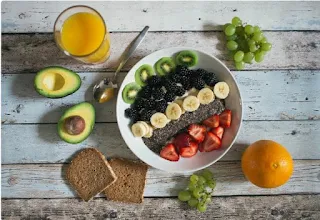A correlation between skipping breakfast and an “increased risk of cardiovascular disease death” has been discovered by researchers.
Why breakfast really might be the most important meal of the day?
1. It promotes healthier-eating. It promotes healthier eating by assisting you in making better food decisions.
People who eat breakfast tend to have healthier diets overall, better-eating habits and are less likely to feel the need for snacks during the day. Children who skip breakfast have a higher likelihood of making poor dietary decisions throughout the day and in the long run. People who skip breakfast frequently munch in the middle of the day or the afternoon. If such snacks are high in fat and salt but lacking in fiber, vitamins, and minerals, this could be an issue. Some people feel tired without the added energy that breakfast can provide and resort to high-energy foods and beverages to help them through the day.
Try a healthy snack like fresh fruit, yoghurt, vegetable sticks, and hommus, or a wholemeal sandwich to stave off mid-morning hunger if you decide to forgo breakfast.
2. It maintains blood-sugar balance.
Having breakfast enables your body to break down blood sugar, often known as glucose. In fact, by eating fruit, cereals, and lean protein within two hours of getting up, you can prevent glucose variations throughout the day.
3. It jumpstarts, boosts, or kickstarts your metabolism.
Your metabolism gets jumped-started in the morning by breakfast. Getting your metabolism going in the morning aids in calorie burning all day. Your body is instructed to preserve calories rather than burn them off if you skip a meal in the morning.
4. It increases physical strength and good health.
The body is energized by breakfast. People who eat breakfast tend to be more active throughout the morning than those who skip it. Exercise prevents weariness and weight gain.
5. It safeguards and promotes heart health.
Studies show that people who miss breakfast frequently end up gaining weight. Weight gain causes blood pressure and cholesterol to rise, which can increase the risk of heart disease.
Of course, when you eat and what you eat are equally important. Ensure that you eat wholesome grains, proteins, fruits, and vegetables.
6. It energizes and increases brain power.
Breakfast can help you stay sharp. Your capacity for concentration, logic, and information processing can benefit from stable glucose levels.
If you skip breakfast, you could feel a little lethargic and find it difficult to concentrate. This is a result of your brain lacking the glucose it needs to function. Studies show that skipping breakfast might affect your mental agility, concentration, and memory. Some jobs may feel more difficult than they would otherwise due to this.
Children and teenagers who consistently eat breakfast perform far better academically than those who don’t. In addition, kids feel closer to the teachers and other adults Additionally, they have a higher sense of closeness with their instructors and other adults at school, which enhances their academic and physical well-being.
7. Decreased dangers of illness.
Those who frequently eat breakfast seem to have a lower risk of obesity and type 2 diabetes compared to those who don’t. Additionally, there is some evidence to suggest that skipping breakfast may increase a person’s risk of cardiovascular disease.
8. Essential minerals, vitamins, and nutrients.
Important nutrients like folate, calcium, iron, B vitamins, and fiber are abundant in breakfast foods. A large portion of your daily overall nutrient intake comes from breakfast. In actuality, those who have to breakfast are more likely than those who skip it to consume the recommended daily amounts of vitamins and minerals.
Even though your body can typically find enough energy to last until the next meal, you still need to top up your vitamin and mineral levels to maintain health and vitality. You can only get the necessary vitamins, minerals, and other nutrients from diet.
Skipping breakfast.
Those who skipped breakfast the most frequently were older women and those who:
- have a poor diet
- are under or overweight
- do not get enough sleep
- have lower physical activity levels
- are from single-parent or lower-income households.
Breakfast skipping is frequently done for the following causes:
- lacking time or preferring to spend extra time in bed- too tired to bother.
- trying to lose weight.
- don’t feel hungry in the morning.
- bored of the same breakfast foods.
- the cost of buying breakfast foods.
- no breakfast foods readily available in the house.
- cultural reasons.
Although it’s not a good idea to skip breakfast, eating well involves more than just how many meals you consume each day. If you skip breakfast, try to make up for it with meals at lunch and dinner by increasing the nutritional value of those meals.
Ideas for healthy breakfast foods.
Research has shown that school-going children are more likely to eat breakfast if there are simple meal options available at home. Some quick suggestions include:
- porridge made from (rolled oats) – Pick quick oats that are simple and then top them with your fruit because flavor-infused kinds can include a lot of sugar.- wholegrain cereal (such as untoasted muesli, whole-wheat biscuits, or bran cereals) with fresh fruit, natural yoghurt, and milk.
- raw nuts and fresh fruits.
- smoothies made with natural yoghurt, milk, and fresh fruit or vegetables.
- natural yoghurt that has been enhanced with fresh fruit for sweetness and raw nuts for crunch.
- English muffins, crumpets, or toast made with whole grains and sourdough spread with baked beans, poached or boiled eggs, tomatoes, mushrooms, spinach, salmon, cheese, avocado, or a few teaspoons of hommus or 100% nut pastes (such as peanut or almond butter).
A dietician weighs in on the findings and limitations of the breakfast study.
For years, we have been told that breakfast is the most significant meal of the day. However, a study that looked at the consequences of missing meals and meal frequency as connected to mortality and heart health and was published in the Journal of the Academy of Nutrition and Dietetics suggests that it may be even more crucial than previously believed.
The purpose of the study, which was released in August of this year, was to determine whether eating habits including meal frequency, meal skipping, and the amount of time between meals were related to mortality from all causes and cardiovascular disease (CVD).
24,011 people aged 40 or older took part in the study between 1999 and 2014 totaling 24 011. Participants who self-reported their eating habits every 24 hours were observed for a variety of eating behaviors by researchers. Through December 31, 2015, death records were used to track causes of death.
Researchers discovered that specific eating habits were associated with greater chances of early death after following participants over time. One study found that skipping breakfast raised the risk of CVD mortality, skipping lunch or supper increased the risk of all-cause mortality, and eating just one meal a day was connected to an elevated risk of both of these types of deaths. Last but not least, the researchers discovered that eating meals too close together (less than four and a half hours apart) was also associated with an earlier death from any cause.
The study emphasized the significance of the results by using the US National Health and Nutrition Examination Survey (NHANES), which found that 40% of Americans skipped meals and at least one in five people aged 20 to 74 skipped breakfast or lunch.
What does this entail for the typical person, then?
In the end, what matters is that a person can meet their dietary needs for optimum health, says Keri Gans, R.D.N, author of The Small Change Diet and host of the podcast The Keri Report. She claimed that skipping meals over time could be detrimental to one’s health and increase the risk of heart disease and several cancers by depriving the body of the nutrients it needs.
While the study has its limits, Gans argues that “breakfast normally is a good vehicle for nutrients associated with a decrease in cardiovascular risk, such as fiber and vitamins C, E, and D.” For example: “Oatmeal cooked with milk, topped with strawberries and almonds, would be a perfect breakfast for heart protection. Although data is not definitive, she cautions that weight gain and osteoporosis may be additional dangers for skipping breakfast.
Researchers emphasized that bad eating and lifestyle habits, overeating, and consuming higher-calorie meals were among possible explanations for why skipping meals may contribute to their findings.
Although this study was extensive in many areas, there are a lot of restrictions. The majority of it was based on a self-reported 24-hour dietary recall, which, according to Gans, “may not always be the ideal tool for nutritional evaluation.” The possibility of inaccurate information exists because the participants might not honestly recollect or report what they consumed. The importance of sleep in the association between diet and mortality, as well as several other unmeasured factors, were identified as being unable to take into account by researchers (like preexisting conditions).
Conclusion: Although these findings regarding the associations between meal skipping and mortality are significant, many other factors contribute to early death. Consuming enough nutrients, such as those in fruits and vegetables, is essential for maintaining general health and reducing the risk of diseases that could shorten life expectancy.










